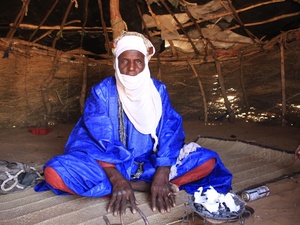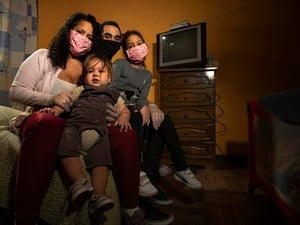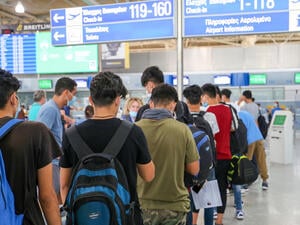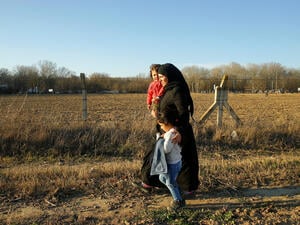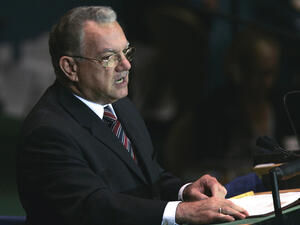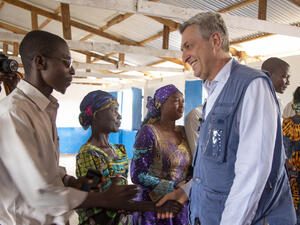UNHCR distributes aid to 40,000 displaced Somalis near Mogadishu
UNHCR distributes aid to 40,000 displaced Somalis near Mogadishu

Two displaced Somali women carry away aid distributed earlier this week in Afgooye.
AFGOOYE, Somalia, May 16 (UNHCR) - The UN refugee agency this week distributed aid to some 40,000 internally displaced people (IDPs) living in more than 50 settlements west of the volatile Somalia capital, Mogadishu.
The recipients of the aid are among an estimated 300,000 people living along a 30-kilometre stretch of road leading from the capital to the town of Afgooye after fleeing months of fighting in Mogadishu between the Ethiopian-backed Transitional Federal Government and rebel forces.
The IDPs targeted during this round of distribution of essential supplies were the most vulnerable households, including people who fled Mogadishu recently, as well as some of the poorest families. The distribution was carried out from Monday to Wednesday in partnership with a Somali non-governmental organization.
Because of the numerous checkpoints set up along the road by militia and soldiers, who extort money in exchange for safe passage, it took two days to bring the aid from Mogadishu to Afgooye.
Each family received one plastic sheet, one kitchen set, three blankets and six sleeping mats - all desperately needed by the displaced. There is particularly high demand for plastic sheets, which the IDPs use to protect their makeshift shelters from the rain.
The rainy season, which started at the beginning of this week, compelled some families without plastic sheeting to seek refuge with friends and neighbours. "There are three families crammed all night in my tiny shelter when it rains" one displaced Somali civilian told UNHCR. "We are 20 people who cannot lie down for lack of space, meaning we cannot sleep."
This first round of distribution will be followed by a second one in a few weeks for another 40,000 IDPs in Afgooye and the outskirts of Mogadishu. Essential supplies will also be distributed in the coming weeks to 12,000 people who fled recently to the town of Marka, some 80 kms south-west of Mogadishu. The seaside town has an estimated 14,000 IDPs from Mogadishu.
Over the last year, UNHCR has distributed aid to more than 100,000 people living in the Mogadishu-Afgooye corridor. More than 42,000 civilians have fled the capital since March, amid escalated fighting. An estimated 800,000 people have fled Mogadishu since the current cycle of violence engulfed the city in February 2007.
Many of the IDPs are becoming increasingly frustrated after spending more than a year in their crumbling shelters along the dusty road to Afgooye. "We want to go back to our homes as we have nowhere else to go, but this has proved impossible so far for lack of peace" one man said. "We grow more desperate as we see new people arriving from Mogadishu week after week. We feel helpless as we cannot do anything but wait for aid from the international community", he added.
Young people have grown especially concerned about the lack of prospects and many talk about leaving for northern Somalia and then making the dangerous Gulf of Aden crossings on flimsy smugglers' boats. They dream of finding work in Yemen, where thousands of boat people are living in camps.
UNHCR has aired awareness-raising campaigns on radio about the risks. More than 18,000 people have crossed to Yemen so far this year. About 400 people have died en route, while others are missing.
Life in the IDP settlements has become even more difficult with the rising cost of food. Displaced people have held several demonstrations in the past few weeks to protest against the rising prices. For example, a sack of rice has risen by 30 percent in just one month.
The need for a means of livelihood is becoming a pressing issue for the IDPs who have been living in Afgooye for months. Responding to this, the UN refugee agency has started a poultry project to help 180 women, most of them widows facing problems in caring for their families.
After training, the women will each receive 20 egg-laying hens. They will raise income mainly through the sale of the eggs. UNHCR has also taken the opportunity to educate the women on their rights, prevention of sexual abuse and the kind of support provided for rape victims.


